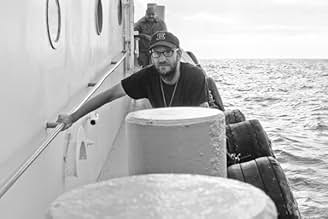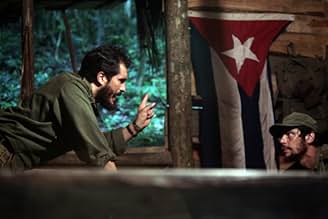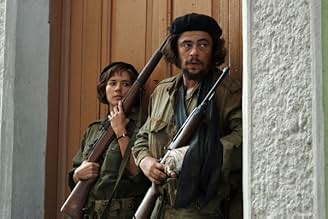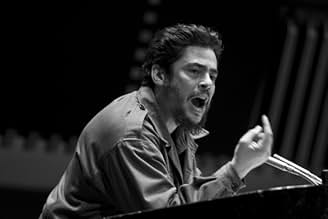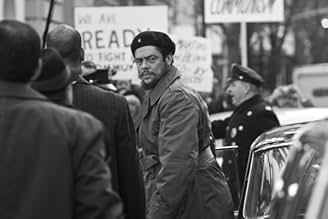NOTE IMDb
7,1/10
49 k
MA NOTE
En 1956, Ernesto « Che » Guevara et une bande d'exilés cubains dirigés par Castro mobilisent une armée pour renverser le régime du dictateur Fulgencio Batista.En 1956, Ernesto « Che » Guevara et une bande d'exilés cubains dirigés par Castro mobilisent une armée pour renverser le régime du dictateur Fulgencio Batista.En 1956, Ernesto « Che » Guevara et une bande d'exilés cubains dirigés par Castro mobilisent une armée pour renverser le régime du dictateur Fulgencio Batista.
- Récompenses
- 4 victoires et 13 nominations au total
Oscar Isaac
- Interpreter
- (as Óscar Isaac)
María Isabel Díaz Lago
- María Antonia
- (as María Isabel Díaz)
Demián Bichir
- Fidel Castro
- (as Demian Bichir)
Ramon Fernandez
- Héctor
- (as Ramón Fernández)
Yul Vazquez
- Alejandro Ramírez
- (as Yul Vázquez)
Jsu Garcia
- Jorge Sotús
- (as Jsu García)
Luis Alfredo Rodríguez Sánchez
- Rebel Messenger #1
- (as Luis Rodríguez Sánchez)
Roberto Santana
- Juan Almeida
- (as Roberto Luis Santana)
Histoire
Le saviez-vous
- AnecdotesFor his role, Benicio Del Toro spent seven years researching Guevara's life.
- GaffesWhen the guerrilleros are in the Sierra Maestra, we can hear the coqui (Eleutherodactylus coqui) singing in the night. However, this small frog is endemic to Puerto Rico and the Virgin Islands, thus not possible to be heard in Cuba.
- Citations
Lisa Howard: What is the most important quality for a revolutionary to possess?
Ernesto Che Guevara: El amor.
Cuban Diplomat #1: [translating] Love.
Lisa Howard: Love?
Cuban Diplomat #1: Love of humanity... of justice and truth. A real revolutionary goes where he is needed.
- ConnexionsFeatured in Así se hizo - Che El Argentino (2008)
- Bandes originalesBasura
Written and Performed by Mark A. Mangini (as Mark Mangini)
Commentaire à la une
What on earth was director Steven Soderbergh thinking when he decided to tackle the story of Ernesto 'Che' Guevara, the Argentinian born doctor and revolutionary who joined Fidel Castro's campaign to take Cuba back from the American backed dictator, Fulgencio Batista? What motivated the director of Oceans Eleven,Twelve and Thirteen
to make this amazing 4½ hour biopic. Why Che Guevara, and why now? How did he even manage to get the funding for a film about a communist revolutionary in the first place? What was the pitch? Not that there is anything wrong with the film. Far from it. Soderberg tells Guevara's story with loving attention to detail, and without resorting to sentimentality or melodrama.
This is not the first time Che's story has been turned into a movie. The 2004 film, The Motorcycle Diaries, examines the formation of Guevara's early politicization, and But Soderberg's film (with Benicio Del Toro in the lead role as Che Guevara), is the first to try and tell the whole story of Guevara's involvement in the Cuban revolution, and his subsequent attempt to spread the revolution to Boliva, where he was eventually caught and killed in October 1967.
Part 1, deals with the fight against Batista. The long hard slog of waging a guerrilla campaign is covered in great detail as a boatload of 82 revolutionaries head for Cuba during November 1956, and the struggle to win Cuba back for the Cuban people begins.
The first film draws extensively on the Guevara's own writings, especially his memoir "Reminiscences of the Cuban Revolutionary War". The months and years of protracted guerrilla warfare are inter-cut with beautifully recreated scenes showing Che addressing the United Nations in 1964, and conducting numerous interviews with a range of media outlets.
Soderberg uses these scenes to explain some of the history and 'back story' to the Cuban revolution, and to give the audience some insight into Che Guevara the man and revolutionary. Part 1 of Che ends in 1959 as Batista flies into exile in the United States, and the revolutionaries under the leadership of Fidel Castro and Che Guevara are about to enter Havana.
Drawing on Guevara's 'Bolivian Diary', Part 2 of Che takes up the story as Che, going under the pseudonym of 'Ramon', lands in Boliva in 1965, and begins trying to recruit local guerrilla's with the intention of overthrowing the ruling government.
Here, his campaign to recruit local peasant farmers fails, and before he and his small band of revolutionaries are able to launch any sort of major anti government attack, they are hunted down and killed with the help of the Central Intelligence Agency.
Che Guevara was wounded and captured on or about October 9, 1967. It is a matter of record that he was alive at the time of his capture, and that he was subsequently shot and killed to ensure he would no longer be able to foment revolution either in Boliva or elsewhere in Latin America. How ironic then that his execution has sparked a 'cult of the revolutionary' that has not diminished over the intervening 40 plus years since his death.
Of course, apart from the Oceans series of films, Soderberg has shown he is socially aware by also directing Erin Brockovich, Traffic (again with Del Toro), and The Good German, so maybe we shouldn't be surprised that he decided to tackle the story of Ernesto 'Che' Guevara.
Don't be fooled by the inclusion of other A-list cast members (Julia Ormond, Matt Damon, Franka Potente, and Lou Diamond Phillips) in Che. All of these actors have minor roles, and small support parts. In fact Matt Damon is on screen for less than two minutes! I can only assume that Soderberg needed some additional well known actors to help secure finance and distribution for the film.
However, this is without a doubt Benicio Del Toros' film. His performance is a revelation. He inhabits the role of Guevara so well, that there are times when I wasn't sure if the historical footage recreated in black and white didn't have the real Che Guevara in them.
According to the program notes, Soderberg is working an a middle part to Che's story. This film will apparently cover Guevara's experiences in Africa. If this is the case, then this trilogy will indeed constitute Steven Soderberg's masterpiece. I can think of no other biopic to rival it, and the finished series should help to keep the legend of 'Che' Guevara alive for at least another 40 years.
This is not the first time Che's story has been turned into a movie. The 2004 film, The Motorcycle Diaries, examines the formation of Guevara's early politicization, and But Soderberg's film (with Benicio Del Toro in the lead role as Che Guevara), is the first to try and tell the whole story of Guevara's involvement in the Cuban revolution, and his subsequent attempt to spread the revolution to Boliva, where he was eventually caught and killed in October 1967.
Part 1, deals with the fight against Batista. The long hard slog of waging a guerrilla campaign is covered in great detail as a boatload of 82 revolutionaries head for Cuba during November 1956, and the struggle to win Cuba back for the Cuban people begins.
The first film draws extensively on the Guevara's own writings, especially his memoir "Reminiscences of the Cuban Revolutionary War". The months and years of protracted guerrilla warfare are inter-cut with beautifully recreated scenes showing Che addressing the United Nations in 1964, and conducting numerous interviews with a range of media outlets.
Soderberg uses these scenes to explain some of the history and 'back story' to the Cuban revolution, and to give the audience some insight into Che Guevara the man and revolutionary. Part 1 of Che ends in 1959 as Batista flies into exile in the United States, and the revolutionaries under the leadership of Fidel Castro and Che Guevara are about to enter Havana.
Drawing on Guevara's 'Bolivian Diary', Part 2 of Che takes up the story as Che, going under the pseudonym of 'Ramon', lands in Boliva in 1965, and begins trying to recruit local guerrilla's with the intention of overthrowing the ruling government.
Here, his campaign to recruit local peasant farmers fails, and before he and his small band of revolutionaries are able to launch any sort of major anti government attack, they are hunted down and killed with the help of the Central Intelligence Agency.
Che Guevara was wounded and captured on or about October 9, 1967. It is a matter of record that he was alive at the time of his capture, and that he was subsequently shot and killed to ensure he would no longer be able to foment revolution either in Boliva or elsewhere in Latin America. How ironic then that his execution has sparked a 'cult of the revolutionary' that has not diminished over the intervening 40 plus years since his death.
Of course, apart from the Oceans series of films, Soderberg has shown he is socially aware by also directing Erin Brockovich, Traffic (again with Del Toro), and The Good German, so maybe we shouldn't be surprised that he decided to tackle the story of Ernesto 'Che' Guevara.
Don't be fooled by the inclusion of other A-list cast members (Julia Ormond, Matt Damon, Franka Potente, and Lou Diamond Phillips) in Che. All of these actors have minor roles, and small support parts. In fact Matt Damon is on screen for less than two minutes! I can only assume that Soderberg needed some additional well known actors to help secure finance and distribution for the film.
However, this is without a doubt Benicio Del Toros' film. His performance is a revelation. He inhabits the role of Guevara so well, that there are times when I wasn't sure if the historical footage recreated in black and white didn't have the real Che Guevara in them.
According to the program notes, Soderberg is working an a middle part to Che's story. This film will apparently cover Guevara's experiences in Africa. If this is the case, then this trilogy will indeed constitute Steven Soderberg's masterpiece. I can think of no other biopic to rival it, and the finished series should help to keep the legend of 'Che' Guevara alive for at least another 40 years.
Meilleurs choix
Connectez-vous pour évaluer et suivre la liste de favoris afin de recevoir des recommandations personnalisées
Détails
Box-office
- Budget
- 35 000 000 $US (estimé)
- Montant brut aux États-Unis et au Canada
- 748 555 $US
- Week-end de sortie aux États-Unis et au Canada
- 61 070 $US
- 14 déc. 2008
- Montant brut mondial
- 34 209 066 $US
- Durée2 heures 14 minutes
- Couleur
- Mixage
- Rapport de forme
- 2.39 : 1
Contribuer à cette page
Suggérer une modification ou ajouter du contenu manquant

Lacune principale
What was the official certification given to Che - 1ère partie - L'Argentin (2008) in Japan?
Répondre
